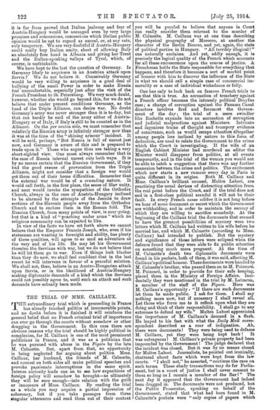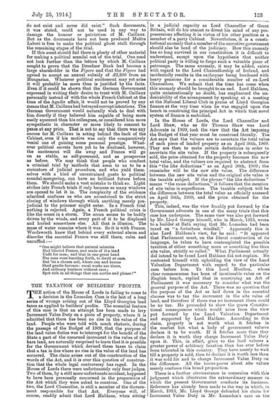THE TRIAL OF MME. CAILLAUX. T HE extraordinary trial which is
proceeding in France has already touched politics at innumerable points, and no doubt before it is finished it will reinforce the general belief that no French criminal trial of importance can ever go through the courts without somehow or other dragging in the Government. In this case there are obvious reasons why the trial should be highly political in complexion, for M. Caillaux is one of the most prominent politicians in France, and it was as a politician that he was pursued with abuse in the Figaro by the late M. Calmette. But, apart from that, no opportunity is being neglected for arguing about politics. Mme. Caillaux, her husband, the friends of M. Calmette, and counsel on both sides all make political speeches and provoke passionate interruptions in the same spirit. Intense curiosity leads one on to see how expositions of foreign policy will somehow be brought—as ultimately they will be sure enough—into relation with the guilt or innocence of Mme. Caillaux. By reading the trial as a whole you may acquire a partial impression of coherency, but if you take passages from these singular utterances and read them out of their context you will be puzzled to believe that anyone in Court can really consider them relevant to the murder of M. Calmette. M. Caillaux was at one time describing the physical geography of Morocco, at another the character of the Berlin Bourse, and yet, again, the state of political parties in Hungary. "All terribly illogical!" one naturally exclaims. And yet, oddly enough, it is precisely the logical quality of the French which accounts for all these excrescences upon the course of justice. A Frenchman holds the State responsible for everything that happens, and therefore it becomes a sort of morbid point of honour with him to discover the influence of the State in what we should call a simple ease of commercial im- morality or a case of individual wickedness or folly.
One has only to look back on famous French trials to see that this is true. An accusation of treachery against a French officer becomes the intensely political Dreyfus case ; a charge of corruption against the Panama Canal directors involves first and foremost the Govern- ment of the day ; the trial of a mere swindler like Rochette expands into an accusation of corruption and judicial malpractices against Ministers. Intricate and ingenious trains of thought and trumpery evidence of connivance, such as would escape attention altogether among people less inclined by nature to this form of deduction, are used to relate the Government to the crime which the Court is investigating. If the wife of an English Cabinet Minister had murdered an editor the Minister would disappear from politics, at all events temporarily, and in the trial of the woman you would not be able to catch a suggestion that there was any further connexion between the crime and politics. The excitement which now starts a new rumour every day in Paris is quite different in its origins. Both M. Caillaux and Mme. Caillaux's brilliant counsel, Maitre Labori, are practising the usual devices of distracting attention from the real point before the Court, and if the trial does not end in a first-class political scandal it will not be their fault. In every French cause célèbre it is not long before we hear of some document or secret which the Government are withholding, and in order to maintain the secrecy of which they are willing to sacrifice somebody. At the beginning of the Caillaux trial the documents that seemed to have the greatest possibilities of mystery were two letters which M. Caillaux had written to his wife before he married her, and which M. Calmette (according to Mme. Caillaux) had intended to publish. But the mystery and significance of those letters were eclipsed when the defence found that they were able to fix public attention on something much more pregnant. At the time of M. Calmette's death two diplomatic documents were found in his pockets, both of them, it was said, affecting M. Caillaux's political honour. These documents were handed to M. Calmette's brother, who passed them on to M. Poincare. M. Poincare, in order to provide for their safe keeping, placed them in the Ministry of Foreign Affairs. Inci- dentally they were mentioned in the trial by M. Latzarus, a member of the staff of the Figaro. Here was M. Caillaux's opportunity : "If there are such documents let them be made public. I ask for them. I shall say nothing more now, but if necessary I shall reveal all. Let those who force me to it reflect upon what they are doing and think of their responsibility. I shall go to any extremes to defend my wife. Maitre Labori appreciated the importance of M. Caillaux's demand in a flash. He leaped to his feet with what the Daily Hail corre- spondent described as a roar of indignation. Ah, there were documents ! They were being used to defame M. Caillaux, yet they were being kept back ! It was outrageous ! M. Caillaux's private property had been impounded by the Government ! The judge declared that the incident was closed, But it was by no means closed for Maitre Labori. Journalists, he pointed out ironically, chattered about facts which were kept from the law courts. "I shall not," he asserted, "continue the case on such terms. These shady transactions may do for Parlia- ment, but in a court of justice I shall never consent to them so long as I remain a member of the Bar !" The next day it appeared that the Government had indeed been dragged in. The documents were not produced, but the Public Prosecutor, speaking on behalf of the Government, stated that what had been found in M. Calmette's pockets were "only copies of papers which do not exist and never did exist." Such documents, it was stated, could not be used in any way to damage the honour or patriotism of M. Caillaux. But as the documents hare not been produced Maitre Labori is free to make the political ghost stalk through the remaining stages of the trial.
If this scent should fail there is plenty of other material for making a political scandal out of the trial. One need not look further than the letters by which M. Caillaux sought to prove that the Dresdner Bank had become a large shareholder in the Figaro and that the Figaro had agreed to accept an annual subsidy of £2,200 from an Hungarian. Whatever political excitement may yet arise it will probably be more than is justified by the facts. Even if it could be shown that the German Government expressed in writing their desire to treat with M. Caillaux personally instead of with the whole French Cabinet at the time of the Agadir affair, it would not be proved by any means that M. Caillaux had betrayed corrupt intentions. The German Government would naturally wish to deal with him directly if they believed him. capable of being more easily squeezed than his colleagues, or considered him more sympathetic in character or more likely to consent to pease at any price. That is not to say that there was any excuse for M. Caillaux in acting behind the hack of the Cabinet, even if his motive was only the comparatively venial one of gaining some personal prestige. What- ever political secrets have yet to be disclosed, however, the excitement will die away and France will go on as stable, as self-possessed, and as prosperous as before. We may think that people who conduct a criminal trial by methods that seem to us to be a caricature of judicial procedure, and who yield them- selves with a kind of unrestrained gusto to political scandal-mongering, can have no brilliant future before them. We should make a vast mistake to think so. Light strikes into French trials if only because so many windows are opened to let it in. The complexity of the evidence admitted confuses us who are accustomed to the strict closing of windows through which anything merely pre- judicial to the prisoner might enter. In a French trial nothing is rejected. Again, a French political crisis is like the ocean in a storm. The ocean seems to be bodily driven by the winds, and every part of it to be displaced and hurled somewhere else. All that is illusion. The mass of water remains where it was. So it is with France. Wordsworth knew that behind every external alarm and disorder the essential France was still there, calm and unruffled :— "One might believe that natural miseries
Had blasted France, and made of it a land Unfit for men; and that in one great band Her sons were bursting forth, to dwell at ease.
But 'tis a chosen soil, where sun and breeze Shed gentle favours: rural works are there, And ordinary business without care ; Spot rich in all things that can soothe and please!"







































 Previous page
Previous page